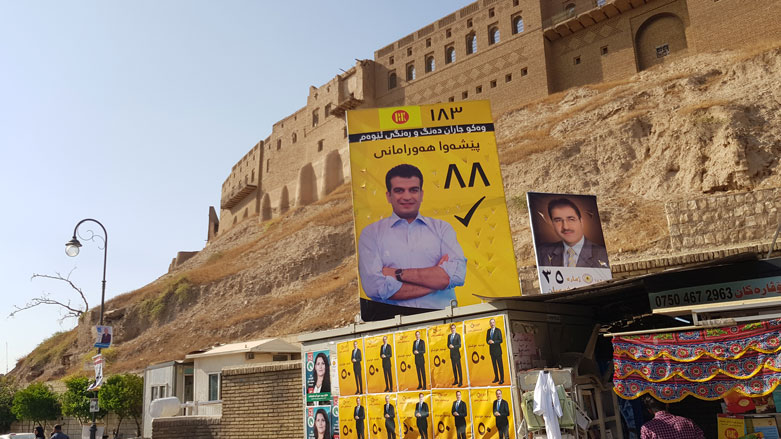More journalists entering politics in Kurdistan Region

ERBIL (Kurdistan 24) – On Sunday, 773 candidates from 29 political parties will compete for a seat in the Kurdistan Region’s parliament. Among them are a number of former journalists who have traded in their media vests for a chance to stand on the other side of the podium.
When the Kurdistan Democratic Party (KDP) launched its election campaign on Sept. 11 in Erbil, there were some surprising prominent faces; journalists Peshawa Hawrami and Hevidar Ahmed.
Hawrami told Kurdistan 24 on that day that those in the media can join politics in part because of their familiarity with the issues of the day.
“Journalists are more aware of the problems and developments and they are more aware of the difficulties the people have,” he said. “Because they report about the problems of people, the people know them and they get more votes.”
He adding that, although this has happened in past elections, this year’s regional vote is seeing an increase in the practice.
Apart from the two journalists listed above who both work for the Rudaw network, at least six presenters on pro-opposition channel KNN have joined the fray as candidates for the Gorran (Change) movement.
Ali Hama Salih, the head of Gorran’s election list, is also a former host of a program on KNN discussing corruption in Kurdistan. He became famous for his program as ‘The Calculator.’
During the last Iraqi election in May at least 30 Iraqi journalists and media figures entered the election, Al Monitor reported. Among them, Sarkawt Shams, the former Washington bureau chief of the NRT channel, successfully became a member of parliament in Baghdad.
Experts suggest that the political role of the older generation of Peshmerga that fought against the Baath-regime is decreasing.
Now those known in the media are beginning to fill the vacuum.
"As the generation with revolutionary credentials die out, and in the absence of platforms where people's ideas and projects can emerge such as think tanks and academic centers, TV screens fill a name recognition gap," Washington Institute analyst Bilal Wahab told Kurdistan 24.
As a result, it was mostly TV journalists with a well-known public face that joined the elections, instead of print journalists.
“That political parties have to field faces made familiar through TV screens (and not print media) is a cosmetic approach to a systemic flaw in Iraqi and Kurdish democracy and elections,” he added.

“In early years, the public voted for a list, which promoted identity politics and empowered politburos. The transition to a mixed system of voting for a party and a person raised the need for candidates with name and face recognition,” he said.
As a result, he contends, journalists have become politicians instead of sticking to journalism.
“In turn, this trend has affected journalism and the media landscape, giving rise to activist and populist journalists who eye a political career rather than hone the profession.”
According to Mohammed A Salih, communication scholar at University of Pennsylvania's Annenberg School for Communication, it is happening not only in Iraqi and Kurdish politics, but also other countries in the world.
“This phenomenon exists in political systems characterized by deep divisions and cleavages where media outlets are either in some form of organic relationship with political parties (in both funding and ideology) or in some way seriously biased toward them,” he said.
Since most media outlets are financed by politicians or parties, he explained, "it makes sense that journalists actually do join political campaigns of the parties to whom their media outlet is close."
“Some of these journalists have some celebrity status of sorts, at least within their respective parties, and this element of visibility and being known to the public is an important asset to their political success and their party’s ability to garner more votes.”
"Some individuals in Kurdistan certainly see media, particularly television, as a shortcut to [a] political career and success. And this might be the fundamental motivating reason for some individuals in Kurdistan to start working as journalists."
However, he says that there is a downside to all this, as it can turn media into a platform for political popularity instead of the media’s traditional job of being a check on those in the government. Journalists can then find themselves beholden to parties that seek political favors.
Salih concluded, “This ought to have some negative effect on the way that journalists do their job and perform the watchdog role that they are ideally expected to play vis-a-vis those in power.”
Editing by John J. Catherine
